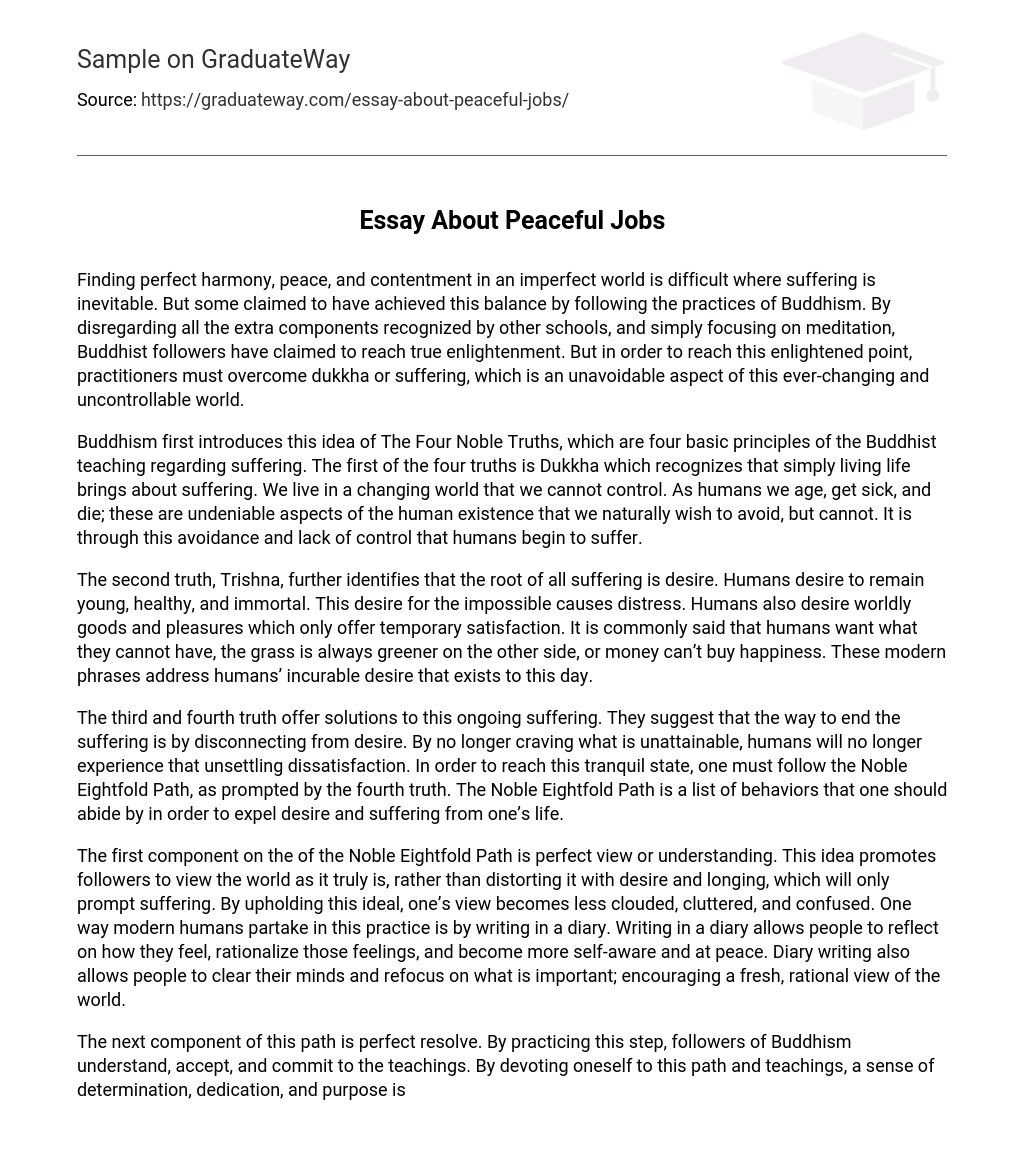Finding perfect harmony, peace, and contentment in an imperfect world is difficult where suffering is inevitable. But some claimed to have achieved this balance by following the practices of Buddhism. By disregarding all the extra components recognized by other schools, and simply focusing on meditation, Buddhist followers have claimed to reach true enlightenment. But in order to reach this enlightened point, practitioners must overcome dukkha or suffering, which is an unavoidable aspect of this ever-changing and uncontrollable world.
Buddhism first introduces this idea of The Four Noble Truths, which are four basic principles of the Buddhist teaching regarding suffering. The first of the four truths is Dukkha which recognizes that simply living life brings about suffering. We live in a changing world that we cannot control. As humans we age, get sick, and die; these are undeniable aspects of the human existence that we naturally wish to avoid, but cannot. It is through this avoidance and lack of control that humans begin to suffer.
The second truth, Trishna, further identifies that the root of all suffering is desire. Humans desire to remain young, healthy, and immortal. This desire for the impossible causes distress. Humans also desire worldly goods and pleasures which only offer temporary satisfaction. It is commonly said that humans want what they cannot have, the grass is always greener on the other side, or money can’t buy happiness. These modern phrases address humans’ incurable desire that exists to this day.
The third and fourth truth offer solutions to this ongoing suffering. They suggest that the way to end the suffering is by disconnecting from desire. By no longer craving what is unattainable, humans will no longer experience that unsettling dissatisfaction. In order to reach this tranquil state, one must follow the Noble Eightfold Path, as prompted by the fourth truth. The Noble Eightfold Path is a list of behaviors that one should abide by in order to expel desire and suffering from one’s life.
The first component on the of the Noble Eightfold Path is perfect view or understanding. This idea promotes followers to view the world as it truly is, rather than distorting it with desire and longing, which will only prompt suffering. By upholding this ideal, one’s view becomes less clouded, cluttered, and confused. One way modern humans partake in this practice is by writing in a diary. Writing in a diary allows people to reflect on how they feel, rationalize those feelings, and become more self-aware and at peace. Diary writing also allows people to clear their minds and refocus on what is important; encouraging a fresh, rational view of the world.
The next component of this path is perfect resolve. By practicing this step, followers of Buddhism understand, accept, and commit to the teachings. By devoting oneself to this path and teachings, a sense of determination, dedication, and purpose is gained, which makes it easier to stick out the journey even with its hardships. We practice perfect resolve whenever we decide to accomplish something we are genuinely passionate about, even if it is difficult. For example, someone deciding to learn a new language is a difficult journey, but their passion and longing to learn will make that journey much easier and provide them with the willpower to persevere; that is perfect resolve.
The next piece of this path is perfect speech. This is being conscious and aware of everything you say, write, and even think about. When one decides to practice perfect speech they choose to no longer spread rumors, gossip, or toxic words. Doing so will lessen the amount of suffering they cause to others and also plays into the idea of neuroplasticity. Neuroplasticity is the idea that how you think shapes who you are and how you perceive the world by forming new connections in the mind made from habit and repetition.
Similarly, perfect action the next another element of the Noble Eightfold Path. This step promotes respect and consideration for others in our actions. By following this piece of the path, one agrees to no longer steal, partake in sexual wrongdoing, lie, do drugs or drink alcohol, or harm others.
The application of perfect action to one’s job is known as perfect livelihood. This step ensures that one’s occupation will not cause suffering for selfish reasons and will respect all life. For example, working in a cannabis shop, liquor store, gun store, or as a butcher is discouraged because it harms or causes suffering to other lifeforms. But being a nurse, firefighter, or any other peaceful jobs are good examples of a perfect livelihood.
Perfect effort is another step needed in order to overcome desire and suffering. Perfect effort encourages positive thoughts and emotions by promotes a healthy, balanced amount of effort. This step develops longevity by ensuring that followers won’t become burnt out when following Buddhism. Today, people partake in perfect effort when they take a mental health day from school or work. By doing so, people are preserving their passion and dedication by ensuring that their thoughts and mindset remain clear and healthy.
The next aspect of this path is perfect mindfulness, which is being aware and present in the moment. By being conscious of what we are doing, we are able to reflect on their behaviors and habits and notice how they influence us. Becoming so absorbing and concentrated on something is perfect mindfulness.
Relatedly, perfect concentration is the final step of the path. This is when one has reached the point that they can focus solely on one object or action without faltering or becoming distracted. This new level of concentration allows one to view the world differently





